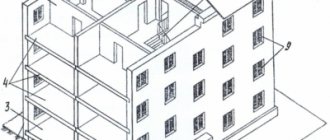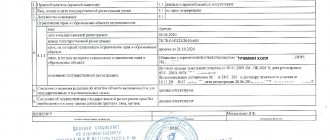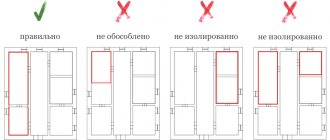Pravozhil.com > Real estate registration > Specialized residential premises - what category of housing is this, we understand the issue
According to the provisions of the Housing Code of the Russian Federation, there are several categories of residential premises on the territory of our country.
So, for example, housing that is socially rented to needy citizens is social housing. And rooms owned by individuals as private property - individual housing stock, and so on.
In today’s material, our resource will consider specialized residential premises, covering this concept in detail from all sides.
Specialized residential premises - what is it, concept and types
What is specialized housing stock?
The concept of specialized housing stock (hereinafter referred to as SHF) is interpreted by the legislator in Article 19 of the Housing Code of the Russian Federation (hereinafter referred to as the Housing Code of the Russian Federation).
In accordance with the provisions of the regulatory act, SZhF is a complex of residential space on the territory of Russia, which is transferred for use to citizens of specific categories.
The grounds, procedure for the provision and execution of contractual relations between the tenant and the landlord of specialized housing are established by the Housing Code of the Russian Federation.
Specialized residential premises include:
- service housing (provided by the employer to his subordinates);
- rooms in dormitories, the Maneuverable Fund, social service centers for citizens, housing funds for the provision of housing to internally displaced persons and refugees (provided by the state to citizens of the Russian Federation).
The commissioning of residential premises into the SZhF is carried out by organizations authorized in this regard. That is, at their discretion, some organization or state (municipality) has the full right to transfer their existing form of ownership into a specialized housing stock. The main thing in this procedure is compliance with the basic rules for the formation of the SLF, which are established by the Housing Code of the Russian Federation.
In particular, these include:
- full compliance of the dwelling transferred to a specialized fund with the previously described types of premises;
- the presence of ownership rights to the premises being transferred to the housing estate, or the presence of a corresponding power of attorney for the persons carrying out the procedure for its entry into a specialized housing stock;
- compliance of the residential premises transferred to SZhF with the housing standards in force in Russia (defined by the Housing Code of the Russian Federation).
Failure to comply with these conditions makes it impossible to introduce some residential premises into a specialized fund and, accordingly, use it as a unit of this category of housing.
You can consider the concept of SLF in more detail by referring to the relevant paragraphs of the Housing Code of the Russian Federation.
The decision to provide specialized housing
The decision to provide needy categories of citizens with apartments from the housing stock at the municipal or federal level is made by the authorized government body, whose competence includes such work in the field of social protection. Only the adoption of such a decision can serve as a legal basis for signing a residential rental agreement with the tenant.
However, it is worth remembering that there is a strict gradation of competencies between levels of government. In other words, in accordance with Government Resolution No. 179, at the federal level, only federal executive authorities can make decisions on the allocation of premises from the housing stock.
The highest authorities make a decision to include a particular property in the list of specialized housing stock, but only within the Federation.
In the legal framework of the constituent entities of the Russian Federation, such decisions can be made by regional authorities. This is evidenced by the legal norm enshrined in Art. 13 Housing Code of the Russian Federation. While the distribution of municipal housing from a specialized fund is within the powers of local authorities, which is supported by Art. 14 of this Code.
Such a division of powers between government bodies at the municipal and federal levels is very important, since due to a violation of the legislative order, the decision made can be declared invalid by the court. This is due to the effect of legal norms prescribed in civil legislation. In particular, Article 168 of the Civil Code of the Russian Federation plays a direct role here, which spells out all the grounds that can serve as a determinant for recognizing the invalidity of a transaction.
Thus, we can conclude that residential premises that are listed in the special purpose fund are real estate that can only be allocated to a strictly limited circle of citizens of the Russian Federation. The concepts of a social rental agreement and a specialized rental agreement should not be confused, since, despite certain similarities, these contracts also have key differences, failure to comply with which can put an end to the legitimacy of the entire transaction.
Author of the article
Possibilities for privatization of objects from a specialized housing stock
Is it possible to privatize specialized housing?
The possibility of privatizing an SLF facility is determined taking into account its owner and the type of premises. More precisely:
- if specialized housing belongs to a non-governmental organization, then privatization is possible only with the consent of its owner;
- if the housing belongs to the state (including the municipality), then privatization is carried out with the consent of the owner, if the premises have the status of a specialized facility or were put into operation after March 1, 2005. Otherwise, the legal procedure for privatization in the Russian Federation will apply.
How are premises included in the SSF?
The key rule for classifying residential premises as a specialized housing stock is that the premises can be included in or excluded from the SLF only by decision of the authorized body that manages state or municipal housing.
To obtain special fund housing status, the applicant requires the following documents:
- an application indicating the desired type of life support (considered for about 1 month);
- a document confirming ownership, economic management or operational management of living space;
- conclusion on the compliance of the premises with all necessary requirements;
- technical certificate of the premises.
The decision to move into special fund housing is made by the owners or authorized persons. A social tenancy agreement is signed in advance.
A different settlement procedure is intended for those who need social protection . They receive living space under a free use agreement.
Housing space from the SLF category is provided only to people who really need it and have no other housing. The list of people who have the right to move into special housing is strictly limited. Everything related to the premises of the SZhF cannot be rented out or alienated.
The exclusion of premises from the specialized housing stock is carried out by the same authorities that decide to assign this status to housing. The procedure is slightly different depending on the set of documents.
The package in this case includes the following documents:
- application for removal of premises from SZhF;
- a photocopy of the social lease agreement or order;
- a signed contract or a photocopy of the work record book;
- a certificate confirming that the applicant does not have any other living space;
- an extract from the house register;
- the employer’s consent to exclude housing from the special fund.
This is a general list of documents; In each specific case, additional paperwork may be required . Upon receipt of a positive decision, a corresponding resolution is drawn up. When removing living space from the SZhF, no requirements are imposed on the premises.
Premises of flexible housing stock
They are intended for temporary accommodation of citizens:
- Those evicted from their permanent place of residence due to reconstruction or major repairs in the house.
- Those who have lost their living space due to foreclosure, acquired using loan funds from a bank or other financial organization or a targeted loan provided by a legal entity for their purchase, and pledged as security for the return of the specified amounts, if at the time of fulfillment of the demand they are the only address of residence.
- Apartments and rooms that have become unsuitable for use. In this case, citizens are resettled in premises of a specialized housing stock, if the specified areas were the only place of their stay.
It should be noted that the above list is not considered exhaustive. Legislation may also define other categories of citizens who have the right to claim the areas that make up the flexible specialized housing stock.
Service apartment
According to Art. 92 of the Housing Code of the Russian Federation (LC RF), a service apartment is one of the residential premises of a specialized housing stock allocated for certain categories of citizens, due to the nature of their labor relations , due to their lack of housing in a particular locality.
According to Art. 93 Housing Code of the Russian Federation, a service apartment is allocated in the following cases:
- the emergence of labor relations between persons: with a state or municipal authority;
- state or municipal enterprise and institution;
The list of positions in which citizens can apply for the use of a service apartment is determined by the decision of state authorities, authorities of a constituent entity of the federation and local governments (Clause 2 of Article 104 of the Housing Code of the Russian Federation). In addition to these, there are other features:
- a rental agreement concluded between the tenant and the government agency acting on behalf of the owner (Clause 1, Article 99 of the Housing Code of the Russian Federation), which establishes the amount of payment for the housing provided. It is in writing and involves some restrictions, for example, a ban on exchange and subletting of an apartment.
- members of his family the right to move into a service apartment , while they have equal rights to use the apartment and are indicated in the lease agreement (Clause 6 of Article 100 of the Housing Code of the Russian Federation).
- The rental agreement for a service apartment is concluded for the duration of the person’s labor relations with the above-mentioned bodies, enterprises or institutions.
Termination of such labor relations is grounds for termination of a previously concluded employment contract.
Registration of the contract
In accordance with the agreement, one party - the owner of the living space or an entity authorized by him - undertakes to allocate to the other - the citizen - a room/apartment for use and possession for temporary stay for a fee. The rental agreement is drawn up on the basis of the relevant decision. The document defines the subject of the transaction, obligations and rights of the parties. The citizen to whom the premises are transferred cannot make an exchange and sublease it. The agreement specifies the family members of the person to whom the apartment/room is allocated. The agreement is drawn up in writing. Standard document forms are approved by the Government.
Apartment for orphans and those left without parental care
The state guarantees social support to orphans and children left without parental care. As one of the types of such social support, according to Art. 8 of Federal Law (FZ) No. 159 of December 21, 1996, the state provides such children with comfortable apartments from among the residential premises of a specialized housing stock (clause 8, clause 1, article 92 of the Housing Code of the Russian Federation).
These residential premises are not provided to all orphans , but only to those who are not tenants of housing under a social tenancy agreement, and are also not the owners of any housing.
Apartments are allocated for the use of such children upon reaching the age of majority , as well as until adulthood - in the case of acquiring full legal capacity before reaching 18 years of age. When carrying out such a procedure, some nuances may arise:
- Apartments for children left without parental care and orphans are transferred to them on the basis of their written application , under a rental agreement for specialized residential premises concluded with them. Payment of expenses associated with the use of these residential premises by such children, in accordance with Art. 5 Federal Law No. 159 of December 21, 1996, is carried out from the budget of the corresponding constituent entity of the Russian Federation.
- Special fund apartments are provided to children upon completion of their stay in educational institutions and social service institutions (boarding schools, shelters). Such housing is allocated to children once for a period of five years. Under exceptional circumstances specified in paragraph. 2 clause 6 art. 8 Federal Law No. 159, the rental agreement can be concluded for a repeated five-year term.
- In general cases, after a five-year period, the apartment transferred to the orphan or child left without care is excluded from the specialized fund and transferred to it on the terms of social rent . Such a person carries out further maintenance of housing independently.
- Persons from among orphans and children left without parental care (subjects aged 18 to 23 years, who were such at the time of majority), as well as persons over 23 years of age who, before reaching adulthood, also have the right to be provided with apartments from a special fund. of this age belong to the above categories.
Example
Citizen C is an orphan due to the death of both her parents. Upon reaching 18 years of age and at the end of her stay at the boarding school, she submitted an application to the local administration in which she asked to be allocated an apartment for her as an orphan. Having considered S’s application, the administration drew attention to the fact that S is the only heir of her father, who after his death left her a two-room apartment and which she duly registered in her name. Guided by Art. 8 Federal Law No. 159 dated December 21, 1996, according to which orphans whose property rights do not have housing have the right to housing from a special fund, the local administration refused to allocate an apartment to S.
- 8.1. Types of residential premises of specialized housing stock and their provision
- 8.2. Rental agreement for specialized residential premises
Topic 8. Specialized housing stock
8.1. Types of residential premises of specialized housing stock and their provision
A special legal regime is established by law for specialized housing stock,
which is a set of residential premises provided to certain categories of citizens temporarily: for the period of temporary or seasonal work or study, minor children, disabled children, orphans, children without parental care, elderly people - in the houses of social protection authorities, and also in cases of urgent resettlement as a result of fires, accidents, natural disasters, before obtaining a new living space or repairing a previously occupied one, and in other cases.
In accordance with Art. 92 LCD residential premises of specialized housing stock include:
1) service residential premises;
2) living quarters in dormitories;
3) residential premises of the maneuverable fund;
4) residential premises in houses of the social service system;
5) residential premises of the fund for temporary settlement of internally displaced persons;
6) residential premises of the fund for temporary settlement of persons recognized as refugees;
7) residential premises for social protection of certain categories of citizens.
As can be seen from the list above, in contrast to the previously effective housing legislation, in the residential complex service residential premises are not recognized as a separate type
residential premises, along with specialized residential premises, and are included among the latter.
of state and municipal housing funds are used as specialized residential premises
The use of residential premises as specialized premises is permitted only after it has been classified as a specialized housing stock in compliance with the requirements and in the manner established by the Government of the Russian Federation. The inclusion of residential premises in a specialized housing stock with the assignment of such premises to a certain type of specialized residential premises and the exclusion of residential premises from the specified stock are carried out on the basis of decisions of the body that manages the state or municipal housing stock.
As provided in Part 3 of Art. 92 of the Housing Code, specialized residential premises are not subject to alienation, transfer for rent, lease, with the exception of the transfer of such premises under lease agreements provided for in Section. IV LCD.
In accordance with Art. 99 of the LCD, specialized residential premises are provided on the basis of decisions of the owners of such premises (authorized bodies of state power or authorized local government bodies acting on their behalf) or persons authorized by them under lease agreements for specialized residential premises, with the exception of residential premises for the social protection of certain categories of citizens who are provided under free use agreements.
Specialized residential premises are provided on the basis established by the Housing Code to citizens who are not provided with residential premises in the corresponding locality.
Service residential premises -
These are residential premises intended for the residence of citizens in connection with the nature of their labor relations with a government body, a local government body, a state unitary enterprise, a state or municipal institution, in connection with service, in connection with appointment to a government position in the Russian Federation or civil service subject of the Russian Federation or in connection with election to elective positions in government bodies or local government bodies (Article 93 of the LC).
According to Art. 104 residential complexes, service residential premises are provided to citizens only in the form of a separate apartment.
The categories of citizens who are provided with official residential premises are established:
1) by a government body of the Russian Federation - in the housing stock of the Russian Federation;
2) by a government body of a constituent entity of the Russian Federation - in the housing stock of a constituent entity of the Russian Federation;
3) local government - in the municipal housing stock.
Lease agreement for office premises
is concluded for the period of labor relations, service or holding a government position in the Russian Federation, a government position in a constituent entity of the Russian Federation or in an elective position. Termination of employment relationships or tenure in these positions, as well as dismissal from service, is grounds for termination of the contract for the rental of office premises.
Residential premises in dormitories
are intended for temporary residence of citizens during the period of their work, service or training. Houses or parts of houses specially built or converted for these purposes are provided for dormitories. The peculiarity of residential premises in dormitories is that they must be equipped with furniture and other items necessary for citizens to live (Article 94 of the Housing Code).
In accordance with Art. 105 LCD residential premises in dormitories are provided at the rate of at least six square meters of living space per person.
Rental agreement for residential premises in dormitories
is concluded for the period of employment, service or training. Termination of employment, study, as well as dismissal from service is grounds for termination of the tenancy agreement for residential premises in a dormitory.
According to the current housing legislation, residential premises in dormitories in all cases, and not only in the presence of certain conditions, as previously provided, are occupied on the basis of a rental agreement.
To the residential premises of the maneuverable fund
include residential premises intended for temporary residence:
1) citizens in connection with major repairs or reconstruction of a house in which there are residential premises occupied by them under social tenancy agreements;
2) citizens who have lost residential premises as a result of foreclosure on these residential premises, which were acquired through a loan from a bank or other credit organization or funds from a targeted loan provided by a legal entity for the purchase of residential premises, and pledged to ensure repayment of the loan or targeted loan, if at the time of foreclosure such residential premises are their only ones;
3) citizens whose only living quarters have become uninhabitable as a result of emergency circumstances;
4) other citizens in cases provided for by law (Article 95 of the Housing Code).
As provided in Art. 106 LCD, residential premises of a flexible stock are provided at the rate of no less than six square meters of living space per person.
These residential premises are provided for the period:
1) until the completion of major repairs or reconstruction of the house (when concluding such an agreement with the citizens specified in clause 1 of Article 95 of the Housing Code);
2) before the completion of settlements with citizens who have lost their residential premises as a result of foreclosure on them, after the sale of the premises on which foreclosure was applied (when concluding such an agreement with citizens specified in paragraph 2 of Article 95 of the Housing Code);
3) until the completion of settlements with citizens whose only residential premises became unsuitable for living as a result of emergency circumstances, in the manner prescribed by the Housing Code, other federal laws, or until the provision of residential premises of the state or municipal housing stock to them in the cases and in the manner prescribed LC (when concluding such an agreement with citizens specified in paragraph 3 of Article 95 of the LC);
4) established by law (when concluding such an agreement with citizens specified in paragraph 4 of Article 95 of the Housing Code).
After the expiration of the period for which the lease agreement
residential premises of the maneuverable fund were provided, this agreement is terminated.
Specialized residential premises include residential premises in houses of the social service system.
These residential premises are intended for the residence of citizens who, in accordance with the law, are classified as citizens in need of special social protection with the provision of medical and social services (Article 96 of the Housing Code).
The procedure and conditions for the provision of residential premises in houses of the social service system for the population and the use of such residential premises are established by federal legislation and the legislation of the constituent entities of the Russian Federation (Article 107 of the Housing Code).
As stated in Art. 97 LCD, residential premises of funds for temporary settlement of internally displaced persons and persons recognized as refugees,
are intended for temporary residence of citizens recognized in the manner established by federal law as forced migrants and refugees, respectively.
The procedure for providing residential premises to funds for the temporary settlement of forced migrants and persons recognized as refugees is established by federal laws (Article 108 of the Housing Code).
Residential premises for social protection of certain categories of citizens
are intended for residence of citizens who, in accordance with the law, are classified as citizens in need of special social protection.
The categories of such citizens, the procedure and conditions under which residential premises of this type are provided are established by federal legislation and the legislation of the constituent entities of the Russian Federation. The peculiarity of these residential premises, as noted above, is that they are provided under contracts for free use
(Articles 98, 109 of the Housing Code).
8.2. Rental agreement for specialized residential premises
Under a rental agreement for specialized residential premises, one party - the owner of the specialized residential premises (an authorized state authority or an authorized local government body acting on his behalf) or a person authorized by him (the lessor) undertakes to transfer this residential premises to the other party - the citizen (tenant) for a fee in possession and use for temporary residence in it (part 1 of article 100 of the Housing Code).
A rental agreement for specialized residential premises is concluded on the basis of a decision to provide such premises.
It defines the subject of the agreement, the rights and obligations of the parties regarding the use of specialized residential premises.
The rules provided for in Art. 65, parts 3 and 4 art. 67 and art. 69 of the Housing Code, with the exception of the use of service residential premises (here the rules provided for in parts 2–4 of Article 31, Article 65 and parts 3 and 4 of Article 67 of the Housing Code apply).
The lease agreement for specialized residential premises specifies the family members of the tenant.
This agreement is concluded in writing.
Standard rental agreements for specialized residential premises
approved by the Government of the Russian Federation.
In accordance with Art. 101 Housing agreement can be terminated at any time
by agreement of the parties.
The tenant of specialized residential premises may
terminate this agreement at any time A rental agreement for specialized residential premises may be terminated in court at the request of the landlord if the tenant and his family members living with him fail to fulfill their obligations under the agreement, as well as in other cases provided for in Art. 83 LCD cases.
The rental agreement for specialized residential premises is terminated due to the loss (destruction) of such residential premises or for other reasons provided for by the housing complex.
As an exception to the general rule, the transfer of ownership of office residential premises or residential premises in a dormitory, as well as the transfer of such residential premises for economic management or operational management to another legal entity entails
entails the termination of the rental agreement for such residential premises, except in cases where its new owner or the legal entity to which it is transferred is a party to the employment contract with the employee who is the tenant of this residential premises (Part 2 of Article 102 of the Housing Code).
Eviction
citizens from specialized residential premises is regulated by Art. 103 of the Housing Code, according to which in cases of termination or termination of rental contracts for specialized residential premises, citizens must vacate the residential premises that they occupied under these contracts. In case of refusal to vacate such residential premises, these citizens are subject to eviction in court without the provision of other residential premises, except for the cases provided for in Part 2 of Art. 102 and part 2 of Art. 103 LCD.
Cannot be evicted
from service residential premises and residential premises in dormitories without the provision of other residential premises who are not tenants of residential premises under social tenancy agreements or family members of the tenant of residential premises under such an agreement, or owners of residential premises or family members of the owner of residential premises and registered as needing residential premises:
1) family members of military personnel, officials, employees of internal affairs bodies, federal security service bodies, customs bodies of the Russian Federation, state fire service bodies, bodies for control of the circulation of narcotic drugs and psychotropic substances, institutions and bodies of the penal system, dead (deceased) ) or missing in action while performing military service or official duties;
2) old age pensioners;
3) family members of an employee who was provided with official living quarters or living quarters in a dormitory and who died;
4) disabled people of groups I and II, whose disability occurred as a result of a work injury due to the fault of the employer, disabled people of groups I and II, whose disability occurred as a result of an occupational disease in connection with the performance of work duties, disabled military personnel who became disabled of groups I and II due to injury , concussion or injury received during the performance of military service duties or as a result of an illness associated with the performance of these duties (Part 2 of Article 103 of the LC).
The above-mentioned citizens are provided with other residential premises, which must be located within the boundaries of the relevant locality.
Eviction of citizens from official residential premises or residential premises in dormitories with the provision of other residential premises in the case provided for in Part 2 of Art. 102 of the Housing Code, is carried out by the previous owner or legal entity transferring the corresponding residential premises.
In accordance with Art. 13 of the Law on the introduction of the Housing Code, citizens who live in office residential premises and residential premises in dormitories provided to them before the entry into force of the Housing Code,
consist in accordance with clause 1, part 1, art. 51 Residential complexes registered as those in need of residential premises provided under social tenancy agreements, or have the right to be registered on this basis, cannot be evicted from these residential premises without the provision of other residential premises, if their eviction was not permitted by law before the entry into force of the residential complex. .
It should be noted that the tenant of specialized residential premises does not have the right to exchange the occupied residential premises, or to sublease it (Part 4 of Article 100 of the Housing Code).
Table of contents








